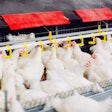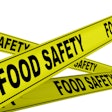
BRF has recalled approximately 394 metric tons of fresh chicken meat due to the potential presence of Salmonella enteritidis, the company announced on February 13.
According to a notice to the market on the BRF website, the Brazil-based company recalled 164.7 metric tons of fresh chicken meat destined to the Brazilian domestic market. BRF also recalled 299.6 metric tons of fresh chicken meat destined to the international market.
All of the products in question were processed at the BRF plant in Dourados, in the Brazilian state of Mato Grosso do Sul. The recalled products were processed on October 30, November 5-7, November 9-10 and November 12, 2018.
The company made decision to recall all the batches of chicken meat processed in Dourados during that time, instead of the affected parts of the production, in accordance with BRF’s precautionary principle and commitment with food safety, quality, and transparency.
The company has already proactively started the inventory and collection of the products either en route or with its clients in the domestic and international markets. It has also deployed a group of specialists to investigate the origins of this sole case to ensure that the appropriate measures are taken to avoid reccurrence, and maintained the production of the plant under a rigorous hold and release process of products to guarantee that the occurrence was a sole event and that it will not be repeated.
Additionally, the incident and the collection of the products were formally reported to the Brazilian authorities, among them, the Ministry of Agriculture, Livestock, and Supply (MAPA) and the National Health Surveillance Agency (ANVISA), having agreed with the latter the basis of the voluntary recall.
BRF stated that it is worth highlighting that the Salmonella bacteria do not resist to heat treatment, meaning that the traditional cooking processes are enough to eliminate any potential hazard caused by the bacteria presence.
The company said it will keep its shareholders and the market in general duly informed about any related developments.















